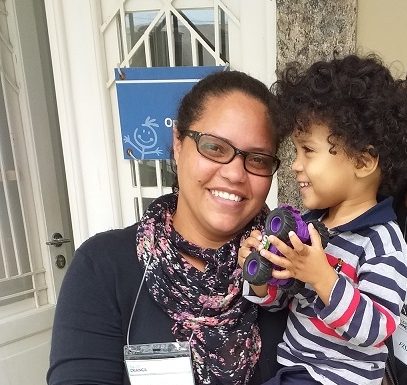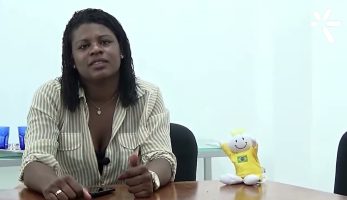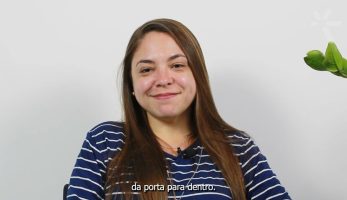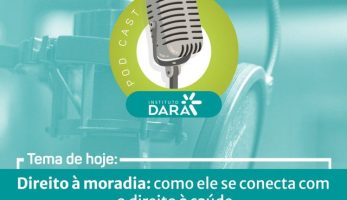“Dara transformed my home – but first it changed my life.”
Months after entering the first apartment, Priscila saw the floor of the property break up with the dust created provoking asthma attacks and convulsions in her son. Dara’s work avoided the worst, but it was just the last act in a partnership that would forever touch her family.
Testimony of Priscila Aparecida de Oliveira, 35 years old
Mother of Helena, 16, and Nicolas, 5
When I was discharged from the Dara Institute, I really just wanted to hug everyone there and shout out to them all about just how important their work is, how much it prevents people like me, with few prospects, and about to be evicted with my kids, from doing something stupid. By the time I rang the farewell bell at Dara, the entire floor of my apartment floor, which had been peeling and breaking up, had just been replaced, which helped stop my son Nicolas from having a string of allergies and seizures. Immediately before I left, Dara transformed my apartment. But it was just the last thing they did for me. First, I need to tell you how they changed my life.
Every mother imagines that she will get pregnant, have a healthy child and continue her life. In my case, my pregnancy with Nicolas, my youngest son, was at risk. At birth, the pediatrician took him to bathe as soon as he came out of my belly, and she told me that he had a congenital anomaly called hypospadias, which causes malformation in the genital region. I left the maternity hospital with a medical attestation for him to undergo corrective surgery. That’s when my struggle began. And it was just the beginning.
I had stopped working because of the risky pregnancy — I had a job in an accounting firm — and now I had to spend all my time with him, looking for a way to try to and get the surgery on the public health system. And I still had my daughter Helena to take care of. We lived in Santa Cruz, in the West Zone of Rio de Janeiro, and the only money coming in was from Nicolas’ father’s job as a gas station attendant, my husband at the time. As the SUS queues in Rio de Janeiro were very long, Nicolas’s father and I had the idea of moving to Itatiaia, a small town in the Mountain Region outside Rio, where some of our relatives lived who said that Health system was much better there than in the capital. We actually got the surgery, but the vacancy ended up being in Rio, at Hospital da Lagoa, by the irony of fate. Ten months after the move, we returned to Santa Cruz, with both of us unemployed and with no money saved. We didn’t even have money for the removal van.
The surgery went well, and I thought life would get back to normal. But three months later, at the surgeon’s review appointment, she realized there was something else wrong with him, and that the problem was neurological, nothing to do with hypospadias. That’s when I got desperate. She referred Nicolas to the neurologist, who discovered that he was autistic and therefore had various health problems. Over time, we discovered that he was also extremely allergic. From there, we were referred to several other doctors, and my pilgrimage began taking him around the city for treatments in different specialties: speech therapy, physiotherapy, occupational therapy, psychopedagogy, psychology…
To this day I can’t work, my life consists of taking him to the doctors. At the time it was much worse. As his father couldn’t get a job — he also suffered from bouts of depression — we didn’t have anything to eat at home. We managed with the children, but I often stopped eating to give them a meal. One way I found was to ask for help on the street. I went to food stalls, cafeterias, and asked for credit. As I’ve always worked, having to beg for money on the street was demeaning. I was ashamed and also felt guilty. I started to go into a deep depression, I began to isolate myself from all my friends and family, I couldn’t stand this situation anymore. I’d rather ask strangers on the street than people I know. Even today it is very painful to remember that time. I often went out with Nicolas on my lap with no money for a return ticket. I had to find a way to order, or sell something on the train, on the buses.
And there was the situation at our house. We owed a lot of rent, and the landlady was about to evict us. We were spending about R$ 600 a month on medication, so any money that came in we had to choose: our house or Nicolas’ health? And the tickets? The food? I started to think that there was no solution for that, that my children would be much better off without me, that our situation was all my fault, that I didn’t try hard enough, that I had done something wrong during the pregnancy. These thoughts enveloped me. In these moments, our own head is the worst enemy.
The last day at rock bottom started at 4:30 am, when I woke up to take Nicolas to another appointment at Hospital da Lagoa. He no longer wanted to breastfeed and was extremely agitated, aggressive, wanting to eat something. In addition to not having anything to give him, I hadn’t eaten anything either. We were both hungry. Arriving at the hospital, a nurse we already knew asked what was happening to him. I just vented, and told her everything. She was very compassionate, gave us something to eat — thank God it was a cookie with no traces of milk, because, among the several severe allergies he had, there was milk protein, a reaction called APLV — and asked the doctor to to refer us to the Dara Institute. I also told the doctor our story, who gave us the referral. We went there the next day because it ended up getting late.
It was July 2019, and I will never forget it. Nicolas was 2 and a half years old, but he only weighed 11 kilos. I had already received help from elsewhere, so I didn’t have high hopes. I thought I would get another basic food basket, just as a way not to see me again. But it was all completely different. To this day I remember the way the social worker looked at me, with compassion, and I remember the hug she gave me to this day. She really wanted to hear what I was saying, she understood my pain. On the same day, we left with a donation of special milk, help with the bus tickets, and they took Nicolas’ prescriptions and paid for all the medicine. We stayed there waiting for the pharmacy to deliver, I could hardly believe it. And we even got a food card to buy produce at the market. I can’t even put into words just how much hope that gave me again. I cried all the way home, as I just could not believe what was happening. It was magical.
We spent almost three years at the Dara Institute, as they extended our time because of the COVID-19 pandemic — it happened to other families too. In the meantime, I split up and rented an apartment with my kids, working from home doing printouts, tax returns, that sort of thing. One of the main ways Dara helped me was the legal and social welfare support they provided to get my son’s benefit, the Benefício de Prestação Continuada (BPC), a monthly minimum wage that the government gives to, among other cases, people with disabilities who are unable to support themselves. But the benefit took almost a year. It’s important to mention this because, when it came, the retroactive one came with it, and I used the money to put down a deposit on the apartment we lived in. The landlord accepted, and I paid monthly installments for my home, and not rent.
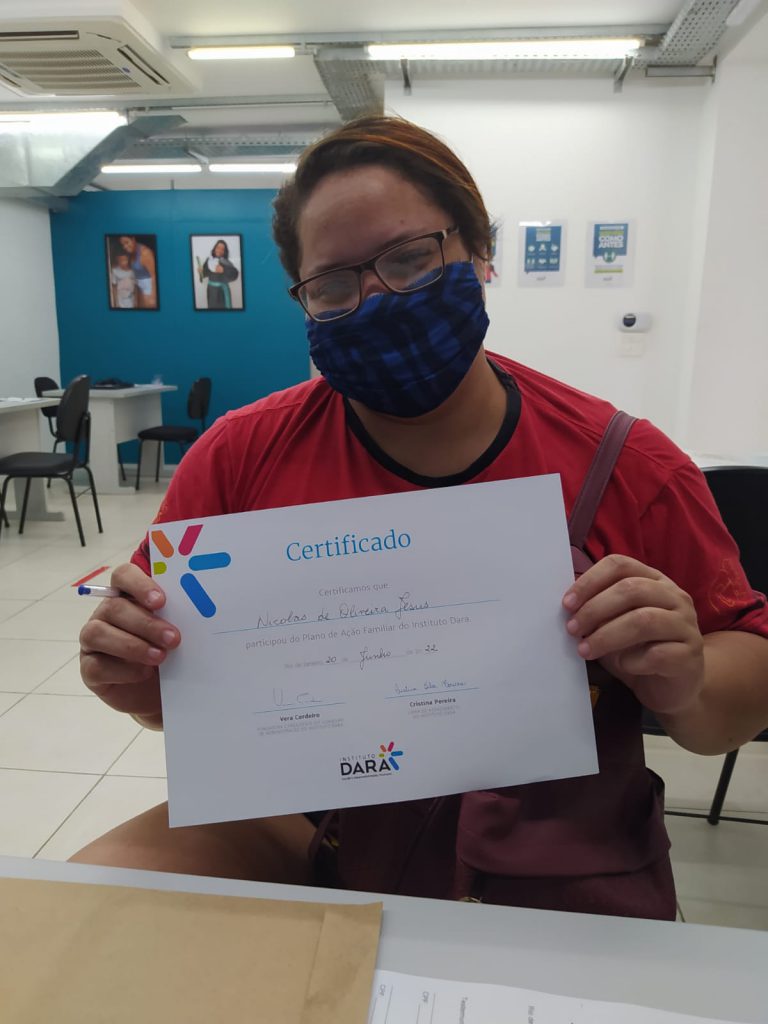
I thought this would be the last time Dara transformed our lives, but in October of last year my living room floor started to peel spreading the dust underneath into the house, just a few months after I’d checked in. The ceramic just cracked and peeled off the floor. It was a Minha Casa, Minha Vida condominium, and the mortar they used was not good quality. And there was no point in cleaning or dampening the area. It got worse, as the floor broke up even faster, extending from the living room into my bedroom, and the bathroom… The whole house was like that. As Nicolas was extremely allergic, he began to have severe asthma attacks, which ended up causing seizures called absence attacks. He had had them before, but they became very, very common. He had three in one week. I was desperate. He lay motionless on the ground, frozen, he looked as if he had died. I was already using two asthma inhalers and a bottle of antiallergic pills every week, but nothing helped. I thought that I would have to move out of there, and that I would have to hospitalise him to avoid the worst.
That’s when Dara’s Housing area ended up helping us before we were discharged. My life was much better, but I still wouldn’t be able to do a work of that size. We first talked in January 2022 and in February Dara went to my house to assess the situation. The work began and finished in April! And the process was really easy. They asked me to get three quotes from building materials stores and three from builders. It was nice because I was able to choose reliable people to come into my home and do the work, which was important because I lived alone with Helena and Nicolas. And I was allowed to choose the new flooring, they didn’t impose any restrictions just to keep the price down. It was all done with a lot of common sense and affection. It took three weeks of work, and Nicolas is now free from asthma attacks and, as a result, has no more seizures. His health greatly improved.
I could spend a whole day telling you about how Dara changed my life. The Nutrition area was very important in Nicolas’s dietary readjustment after the diagnosis of APLV and the food selectivity required, very common in autistic individuals. But I would also like to mention the Psychology team. As soon as I walked into Dara, I was given a list of the staff’s phone numbers and the instruction that I could call collect whenever I needed to. I started talking to the psychologist immediately after the screening. As I said, I was having really bad thoughts when I walked into Dara, and I was almost clinically depressed. Until things got better, I talked about giving it all up. And she would help me, spend almost an hour on the phone with me, trying to dispel these thoughts. She was always a sweetheart, she gave me attention that I never expected to receive. It went far beyond what a psychologist normally does, as she really tried to understand everything that was happening to me. Right after the works on my apartment, I was released from Dara to make room for another family in need, who need the same hug that saved my family. But even after we have left, we are never alone or forgotten. It’s like a new family that we have with us forever. I will be eternally grateful for everything they did for me.
Array